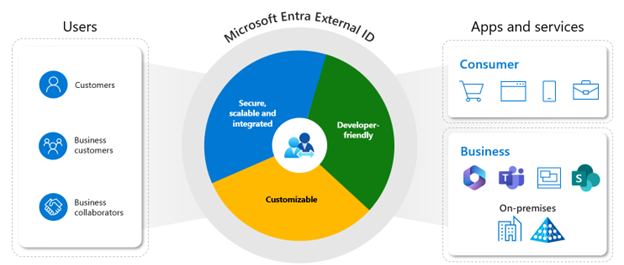Enhancing Security and Efficiency for External Access Management With Microsoft Entra ID
Microsoft has announced the general availability of Microsoft Entra External ID, starting May 15, 2024. This advanced tool is pivotal in customer...
3 min read
cloudservuscom May 2, 2024 7:59:16 AM

Explore the significance of cloud security assessments in safeguarding data and maintaining privacy in 2024.
Data protection has become a top priority for businesses of all sizes. With the increasing reliance on cloud technology, the need to safeguard sensitive information has never been more crucial. As we look past 2024, the importance of data protection will only continue to grow.
Data breaches and cyber attacks have become all too common, and the consequences can be devastating. Not only do businesses risk financial loss, but the trust of their customers and partners can also be severely damaged. This is why taking proactive measures to protect data is essential.
By conducting a cloud security assessment, businesses can gain a comprehensive understanding of their current security posture and identify potential vulnerabilities. This assessment involves evaluating the effectiveness of security controls, identifying gaps in security measures, and recommending actions to mitigate risks.
In 2024 and beyond, data protection will be a critical aspect of business operations. Companies must invest in cloud security assessments to ensure the confidentiality, integrity, and availability of their data. By doing so, they can stay one step ahead of cyber threats and protect their most valuable asset.
Cloud security assessments are a systematic and thorough evaluation of an organization's cloud security measures. They involve a comprehensive review of security controls, policies, and procedures to assess their effectiveness in protecting sensitive data.
During a cloud security assessment, various aspects of cloud security are examined, including data encryption, access controls, network security, and incident response procedures. The assessment may also include a review of compliance with industry regulations and best practices.
The goal of a cloud security assessment is to identify vulnerabilities, weaknesses, and gaps in security measures. This allows businesses to take proactive measures to strengthen their security posture and mitigate potential risks.
A cloud security assessment provides businesses with a holistic view of their cloud security infrastructure and helps them understand the steps needed to enhance their data protection measures.
There are several key benefits to conducting cloud security assessments:
Conducting cloud security assessments offers numerous benefits for businesses, including identifying vulnerabilities, strengthening security measures, ensuring compliance, and enhancing customer trust.
A comprehensive cloud security assessment should include the following key components:
By including these key components in a cloud security assessment, businesses can obtain a comprehensive and accurate evaluation of their cloud security posture.
Once a cloud security assessment is complete, it is essential to implement the recommendations provided. These recommendations are designed to address any vulnerabilities or weaknesses identified during the assessment and enhance the overall security of the cloud infrastructure.
Implementing the recommendations may involve various steps, such as updating security controls, enhancing network security measures, implementing encryption protocols, and providing additional training for employees.
It is crucial to prioritize the implementation of recommendations based on their severity and potential impact on the organization's security. Regular monitoring and evaluation should also be conducted to ensure that the implemented measures are effective in mitigating risks.
By taking prompt action and implementing the recommendations from a cloud security assessment, businesses can significantly enhance their data protection measures and reduce the risk of data breaches or cyber attacks.
CloudServus offers comprehensive cloud security assessment services to help businesses safeguard their data and maintain privacy. With our expertise and experience in cloud security, we can assist organizations in evaluating their security posture and identifying potential vulnerabilities.
Our cloud security assessment includes a thorough review of security controls, policies, and procedures. We provide detailed recommendations tailored to each organization's specific needs, ensuring that they have a roadmap for enhancing their data protection measures.
In addition to the assessment, CloudServus offers ongoing support and guidance to help organizations implement the recommended security measures. Our team of experts can assist with updating security controls, enhancing network security, and providing employee training.
With CloudServus, businesses can have peace of mind knowing that their data is protected and their cloud infrastructure is secure. Contact us today to learn more about our cloud security assessment services and how we can help your organization.

Microsoft has announced the general availability of Microsoft Entra External ID, starting May 15, 2024. This advanced tool is pivotal in customer...

Explore the significance of cloud security assessments in safeguarding data and maintaining privacy in 2024. The Importance of Data Protection in 2024

2024 has been full of excitement already and one of the factors is that Microsoft made many major announcements! We already covered the release of ...